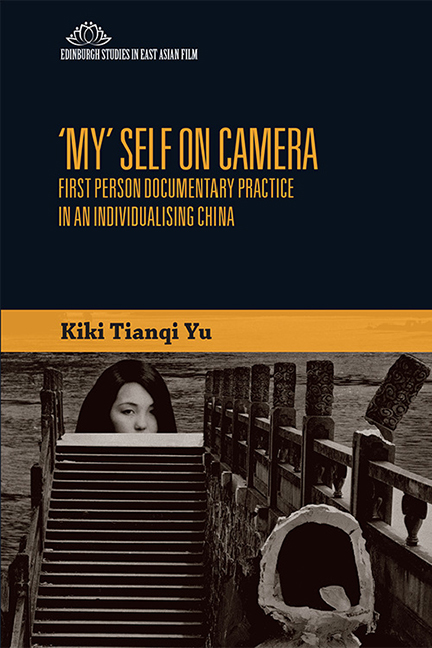Book contents
- Frontmatter
- Contents
- List of Figures
- List of Main Terms with Chinese Translations
- List of Names with Chinese Character Translations
- Acknowledgements
- Dedication
- Introduction: Action, Amateurness and the Changing Sense of the Individual Self
- 1 Female First Person Documentary Practice: Negotiating Gendered Expectations
- 2 Amateurness and an Inward Gaze at Home
- 3 Nostalgia toward Laojia: Old Home as an Imagined Past
- 4 First Person Action Documentary Practice: Longing for a More Politicised Space
- 5 The Problematic Public Self: Ethics, Camera and Language in Contestable Minjian Public Spaces
- 6 Camera Activism: Provocative Documentation, First Person Confrontation and Collective Force
- 7 Whose Self on Camera? Motives, Mistrust, Disputed Authenticities
- 8 From Fragile First Person Documentary Practice to Popular Online First Person Live Streaming Broadcast – Zhibo: Changing Intentions, Changing Individual Selves
- Filmography
- Bibliography
- Index
1 - Female First Person Documentary Practice: Negotiating Gendered Expectations
Published online by Cambridge University Press: 10 November 2020
- Frontmatter
- Contents
- List of Figures
- List of Main Terms with Chinese Translations
- List of Names with Chinese Character Translations
- Acknowledgements
- Dedication
- Introduction: Action, Amateurness and the Changing Sense of the Individual Self
- 1 Female First Person Documentary Practice: Negotiating Gendered Expectations
- 2 Amateurness and an Inward Gaze at Home
- 3 Nostalgia toward Laojia: Old Home as an Imagined Past
- 4 First Person Action Documentary Practice: Longing for a More Politicised Space
- 5 The Problematic Public Self: Ethics, Camera and Language in Contestable Minjian Public Spaces
- 6 Camera Activism: Provocative Documentation, First Person Confrontation and Collective Force
- 7 Whose Self on Camera? Motives, Mistrust, Disputed Authenticities
- 8 From Fragile First Person Documentary Practice to Popular Online First Person Live Streaming Broadcast – Zhibo: Changing Intentions, Changing Individual Selves
- Filmography
- Bibliography
- Index
Summary
Communication is truth; communication is happiness. To share is our duty; to go down boldly and bring to light those hidden thoughts which are the most diseased; to conceal nothing; to pretend nothing; if we are ignorant to say so; if we love our friends to let them know it.
Virginia Woolf (2003: 64–5)Within a decade of Deng Xiaoping's Southern Tour in 1992, a new intensification in development of the socialist market economy ‘with Chinese characteristics’, China's post-Mao reform had also stimulated what the anthropologist Yan Yunxiang observes as an ‘individualisation process’, in which individuals have been largely untied from previous social institutions, and have gained more space and autonomy to develop their own lifestyle choices (Yan 2009: xxvii). Alongside China's colossal economic boom and rapid mass urbanisation, individuals were quietly transforming their social roles, often in subversive ways. Three amateur women filmmakers pioneered first person filmmaking in the beginning of the twenty-first century, consciously and unconsciously examining and reconstructing their individual subjectivities.
This chapter focuses on these three female filmmakers and their first person films made in 2000 and 2001: Nightingale, Not the Only Voice (dir. Tang Danhong, 2000); They Are Not the Only Unhappy Couple (dir. Wang Fen, 2000); and Home Video (dir. Yang Lina, 2001). As both aesthetic and social pioneers, these women were experimenting with a new documentary language to express their subjectivity and thus depart from earlier Chinese independent documentary practices in the 1990s, for two key reasons. First, unlike many documentaries traditionally made by male filmmakers, the women who made these films highlight a personalised vision of reality by bringing their own intimate familial spaces to wider audiences and reflexively turning themselves into key characters in their own films. Second, their first person documentary practice often arises from a subversive impulse. It departs from the political economy of the mainstream film industry, connecting a new strand of film practices to what is regarded as the iGeneration canon (Wagner and Yu 2014), and at the same time it challenges these filmmakers’ traditional roles as women constrained by patriarchal expectations and the burdens of institutional and familial persecution.
- Type
- Chapter
- Information
- My Self on CameraFirst Person Documentary Practice in an Individualising China, pp. 37 - 60Publisher: Edinburgh University PressPrint publication year: 2018



